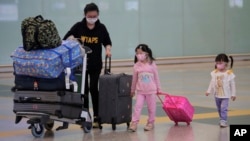People returning from Western countries are bringing a new wave of coronavirus cases to parts of Asia such as Hong Kong and Taiwan.
This is happening as health officials in the area were getting their outbreaks under control.
The development, which health officials describe as “imported cases,” threatens disease control work and economic recoveries.
“Once they’re overseas, situations easily develop,” Taiwan health and welfare Minister Chen Shih-chung said this week. “However, (returnees) have the right to live here, so if they have any symptoms, we do our best to intercept them at the airports.”
Flights to East Asia being watched
Chen said people arriving from heavily infected places such as Western Europe and the United States brought many new cases last week. The Taiwan Centers for Disease Control said most of the new cases reported earlier this week had come to the island from other countries.
The total number of cases in Taiwan has grown nearly five times since early March.
Late last week, Hong Kong recorded 48 cases in one day resulting in warnings there about arrivals from overseas.
Singapore had contained its outbreak, one of the world’s earliest. However, people returning from overseas have pushed the total caseload higher. Singapore’s Ministry of Health said many of the new cases were imported local media reported.
People are returning to Taiwan from overseas for several reasons, including school cancellations, Taiwanese health minister Chen said. Those returns will continue for another two weeks, he predicted, before everyone gets back. The daily number of people entering Taiwan is decreasing and totaled about 4,600 early this week.
Bans on foreign visitors
Taiwan, Singapore, Malaysia and Vietnam have all banned most foreign visitors. Taiwan took the extra step Sunday of barring transit passengers. Quarantine rules have been strengthened on arrivals with any kind of passport. People arriving in Hong Kong from anywhere in the world are ordered to quarantine. Taiwan asks airplane passengers to report travel histories and any clear symptoms.
Most airplane passengers are returning home as few people are starting trips, said Brendan Sobie. He started the Singapore-based advising company Sobie Aviation.
“What will happen in Singapore and Taiwan and Hong Kong will depend on the cases that came from abroad,” said Rajiv Biswas, Asia-Pacific chief economist at the information services company, IHS Markit. “If it can be kept under control for the next couple of weeks, then hopefully things should get better,” he said.
Economic recovery could be affected
In China, where the virus spread began, citizens have slowly returned to work this month. People have started going out to eat again and to visit stores. In Taiwan, children are still attending school, workplaces remain open and restaurants are filled on weekends.
But experts warn that bans on foreign travel into Asian countries will reduce how much people spend there, especially in the case of foreign travelers. For example, Vietnam's normally active tourism industry is almost completely quiet. The country reported a few imported coronavirus cases this month. There are more than 230 confirmed cases there.
Adam McCarty is chief economist with advisory company Mekong Economics. He said travel bans mean little economic improvement can be made.
“If people can’t travel from one country to another, then demand will not pick up no matter how much money you throw at the problem, so it’s really different (from) just a normal downturn,” McCarty said.
Mario Ritter Jr. adapted the VOANEWS report for VOA Learning English. Caty Weaver was the editor.
________________________________________________________________
Words in This Story
outbreak –n. a sudden increase or spread of something like disease or fighting
trend –n. the general direction of how a situation is changing
symptom –n. a sign of a disease or infection
intercept –v. to stop someone from going from one place to another
epicenter –n. the place where an event like an earthquake or disease outbreak starts
tourism–n. the practice of traveling for recreation
transit –adj. in the process of going to a place
quarantine –n. to be kept separate from other to prevent the spread of disease





